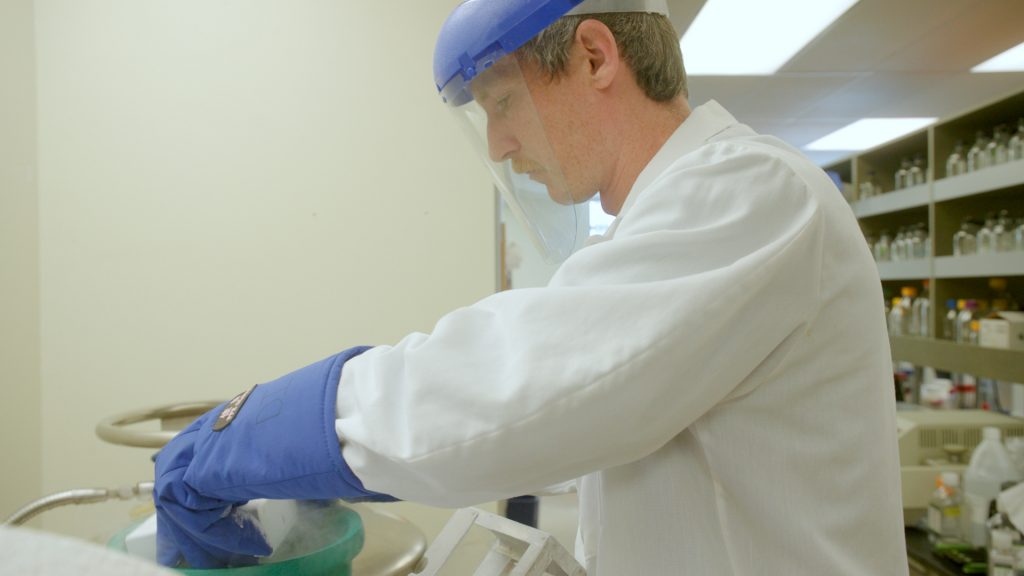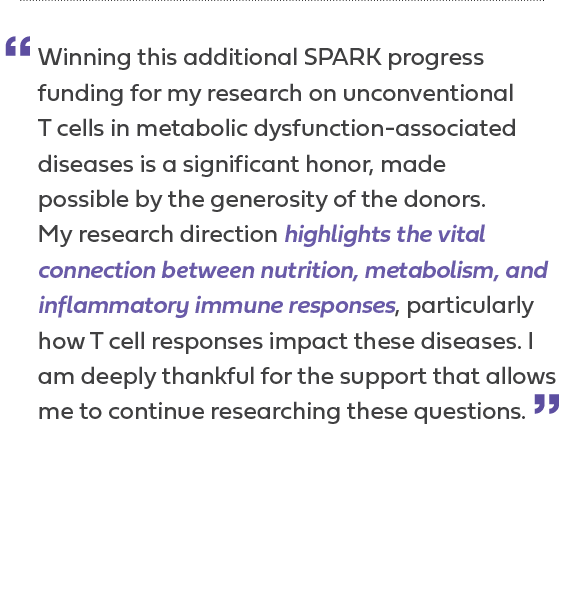“I want to sincerely thank all the donors who made this possible. I am deeply thankful for the opportunity to continue investigating these important questions and to build on the promising preliminary data we generated thanks to earlier SPARK support.”
2024 Tullie and Rickey Families Spark Awards & 2024 Progress Pitch Competition Winner
Thomas Riffelmacher, Ph.D.
Are fat-addicted MAIT cells driving liver disease?
Funded: January 2024
Funded by: The generosity of LJI Board Director David Rickey and the Rickey Family
Fatty liver disease affects 30-40 percent of U.S. adults and often goes unnoticed in its early stages. Fatty liver disease is triggered by factors like alcohol consumption and poor diet, and can lead to severe conditions such as steatosis and liver cancer. My SPARK project investigates Mucosal Associated Invariant T (MAIT) cells, which produce the molecule IL-17, a key driver of the disease.
I developed a system to isolate MAIT cells from donor samples and assessed their responses under various conditions. By culturing these cells with labeled glucose, I measured their glucose consumption and metabolic activity, compared to CD8+ T cells. This analysis may help uncover metabolic factors that cause MAIT cells to contribute to disease progression.
Supported by SPARK, I’m analyzing MAIT cells from individuals with different body mass indices (BMI) and fatty liver disease. This research seeks to find targets to stabilize or repair liver tissue, potentially leading to new treatments for fatty liver disease.
What was the goal of your SPARK project?
Immune cells use molecules called cytokines to communicate with each other. Cytokines can drive immune cell behavior, and certain cytokines are linked to disease progression. Scientists have found that a cytokine called IL-17 may play a role in fatty liver disease progression. My goal was to learn more about the immune cells that produce IL-17 in the liver. I had previously found a subset of MAIT cells that produces high levels of IL-17 in the lung. For my SPARK project, I isolated MAIT cells from people with and without liver disease or metabolic syndrome (a disease driven by fat accumulation) to understand MAIT cell function and IL-17 production in the liver.
SPARK Project Results
I set up a system to isolate pure MAIT cell populations from patients, and I analyzed how the cells responded under various conditions, including how these cells used glucose versus fatty acids. By uncovering how MAIT cells used different nutrient metabolites, I could compare their behavior to different immune cells and study how MAIT cell behavior might change in fat-driven disease states. I also examined markers on the MAIT cell surface and measured IL-17 production under different conditions. This allowed me to determine how metabolic factors may activate certain pathways in MAIT cells and trigger changes that could drive disease. These findings bring us closer to finding targets to stabilize or repair liver tissue, potentially leading to new treatments for fatty liver disease.
What’s next for Thomas?
I have accepted a professorship position at the University of Cologne in Germany. This new role represents a significant step forward in my academic and professional journey. My family and I will be relocating to Germany this summer, and I look forward to continuing and expanding this line of work.
2024 Progress Pitch Competition and Winner Progress
Recognizing and advancing promising research
The 2024 Tullie and Rickey Families SPARK Awards winners had the unique opportunity to compete for an additional $25,000 SPARK award to further their research. This event, known as the Progress Pitches, provides an extra boost to some of the most promising SPARK-funded projects. The goal is to help scientists maintain their momentum in establishing proof-of-concept data and prevent potential funding gaps. During the Progress Pitches, each scientist presented the advancements made with their initial SPARK Award and proposed a continued line of research. A panel of SPARK program stakeholders and LJI Board Members reviewed the presentations and selected this year’s winner, Dr. Thomas Riffelmacher.


What’s next for this project?
In the first phase of my SPARK project, we were able to generate for the first time a metabolomics dataset of human MAIT cells, which identified an alteration in amino acid utilization in a particular subset. In this next phase, we will follow up on this with additional experiments to measure amino acid metabolism in healthy individuals vs patients with fatty liver disease. My aim is to uncover specific drivers of metabolic dysbiosis (an imbalance in the gut microbiome) and how this condition is linked to MAIT cell function and cytokine production. I am also looking beyond IL-17 to understand how MAIT cells regulate a range of other key cytokines.
I’m curious whether we can alter the metabolic choices of MAIT cells to reshape their effector cytokine profiles. I’m also planning to test how pharmacologic and CRISPR-based genetic modification of metabolic genes affect MAIT cell function.
The ultimate goal is to find metabolic dependencies of MAIT cells, which will allow us to prevent their inflammatory reprogramming in metabolic disease.